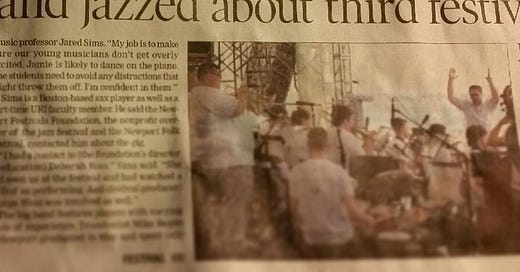Three Things that Jazz Educators Could Learn from George Wein
I have had the pleasure of working with George Wein and his Newport Festivals Foundation. Several times I lead university jazz ensembles at the festival, assembled and rehearsed university players for Jamie Cullum's headlining set in 2015, and currently serve as the Artistic Director for The Jazz Camp at Newport. George was an impassioned, hands on leader who has left a tremendous mark on jazz and the history of the music.
From my perspective, there are three things that stand out that educators should learn from George:
BE AN ANTIRACIST
I am borrowing the term "antiracist" from Ibram Kendi's book How to Be an Antiracist, which highlights ways in which white people can acknowledge that systemic racism exists and to take action to build a more antiracist society. Interracial relationships were illegal in some states when he married his wife Joyce and together they worked in integrate jazz clubs in Boston in the 1950s. George never held back from telling the truth about his frustration that the early Newport Jazz Fest after parties in the fancy Newport mansions would exclude festival performers such as Duke Ellington or Louis Armstrong because of their skin color.
JAZZ SHOULD NOT BE A "RICH KIDS' HOBBY"
In our work with the Jazz Camp at Newport, George let it be known that we needed to provide a summer camp experience for high school players without charging a prohibitive fee. He sought to expose live jazz performances to underprivileged students in the community outreach programs in that area.
BE FORWARD THINKING
George's festivals presented a mix of traditional music with music considered on the cutting edge of jazz. There would be aging veterans but he was also seeing fresh young talent. That is a bold move for a festival promoter with a lot of money on the line and a lot of tickets to sell.
Given his unique position in jazz music, George Wein had a very valuable perspective, so we should ask ourselves these questions:
We are we as educators being actively antiracist in our curriculum, repertoire, and delivery of instruction?
What are we doing as educators to be certain that music isn't just a "rich kids' hobby?"
Are we as educators looking forward to the future of jazz by presenting our students with concepts beyond bebop and hard bop repertoire and style?


